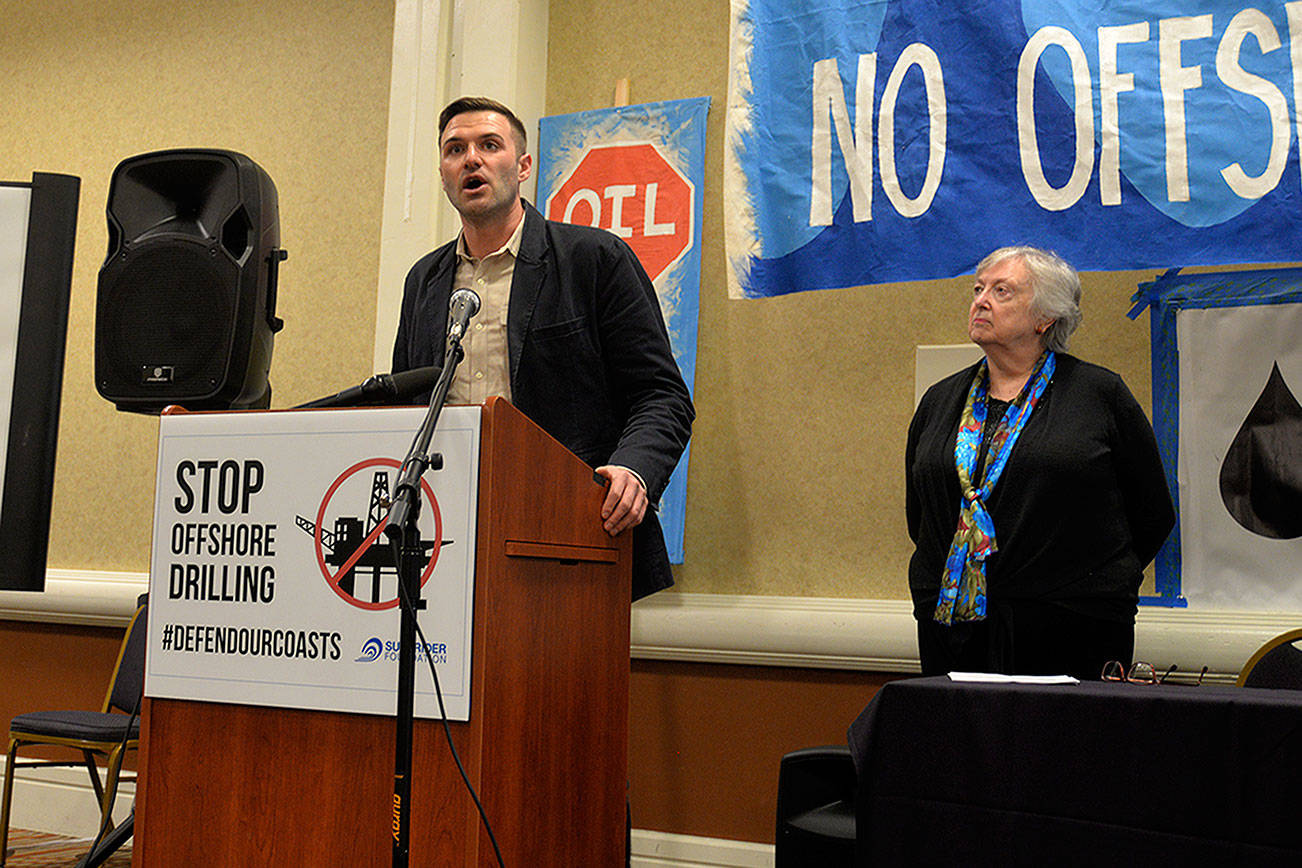At a rally timed to coincide with an informational open house on the Trump Administration’s proposal to reopen offshore drilling for oil and gas, Grays Harbor representatives joined state officials Monday in Olympia to denounce the plan.
More than 100 people attended, most of them staunchly opposed to the proposal, citing the potential for environmental and economic dangers associated with oil drilling. Washington Attorney General Bob Ferguson told attendees he would sue if the plan gets approved.
“What this administration has done with this proposal is outrageous, it’s B.S., in the words I heard earlier,” he said. “… I’m confident that if we need to go to court again to defend the rights of our people, our tribes, and the environment in the state, we will be successful.”
State Senator Kevin Ranker and Commissioner of Public Lands Hilary Franz also attended and stated their opposition.
On Jan. 4, the Trump Administration announced it would lift a drilling ban imposed by President Barack Obama near the end of his term and give energy companies access to nearly all U.S. coastal waters.
The rally, titled the “People’s Hearing,” took place immediately before a Bureau of Ocean Energy Management (BOEM) open house in the adjacent conference room of the Red Lion Hotel. BOEM, which is a federal group within the U.S. Department of Interior that manages offshore energy development, did not field public comments at its event. The Stand Up To Oil coalition organized the earlier opposition event to give the public a chance to get opinions heard.
Various Grays Harbor speakers, such as Ocean Shores Mayor Crystal Dingler, Mark Ballo of Brady’s Oysters, Johannes Ariens who owns Loge Camps in Westport and Kyle Deerkop from Pacific Seafoods also voiced their opposition at the rally. Dingler said that Ocean Shores and other coastal cities, such as Westport, depend on the ocean for their economies based on tourism and fishing, and that oil drilling would threaten that.
“Ocean Shores is a tourism spot, a mecca if you will,” said Dingler. “We enjoy having people visit us, but that’s our whole existence. The economy of that city is built on it. You look on Westport, that city is built on fishing. We’re all together in this, we all work with the water. If we let that go, and let President Trump have his way, then we have failed in what we should be doing.”
Deerkop, who manages an oyster farm on Grays Harbor, said the threat of oil spills and other negative ocean impacts would put his business at risk.
“The risk posed by additional oil exploration is real, and it’s real for the natural resources,” said Deerkop. “We have some of the best managed fisheries and cleanest waters in the world. It is real for the families who depend on the wages from a working waterfront. The risk is real for me and my family.”
The proposal to reopen U.S. waters for drilling is still in an early phase. Assistant Attorney General Bill Sherman described it as a “long and involved process,” and said it would involve multiple rounds of comments and drafts of proposed plans by the federal government. If a final plan were eventually approved, Sherman said there would then be individual proposals for leases on specific offshore areas, along with environmental impact statements for all of the proposals.
After the opposition rally finished, some attendees walked over to the BOEM workshop, where about a dozen BOEM scientists and officials were on hand to address any questions about their operations.
These booths included recent reports on oil quantities in offshore areas, and another explaining the lengthy procedure ahead for the administration to pass such a proposal to reopen land for purchase. About five or six police officers were also stationed around the room.
Another reason for the workshop was to collect feedback. In the corner were several tables with forms and computers asking for feedback and comments on the government’s proposal.
When asked if BOEM feels pressure to be in favor of the offshore drilling due to it being a federal agency, Branch Chief for Environmental Consultation Brian Jordan said they have not had to modify their procedures since the proposal.
“We haven’t felt that type of pressure at all,” he said, adding that BOEM is allocated $30 million annually to fund scientific research. “… We have not been asked to suppress science in any way, our job is to make sure the best science is in front of the decision-maker when they make those decisions.”
Bill Brown, chief environmental officer for BOEM, said it has been an “organizational challenge” to schedule additional meetings to discuss U.S. offshore drilling since the administration announced the proposal in January. The organization has also been conducting additional studies as a result of the proposal, he said.
While the BOEM workshop was under way, dozens stayed back at the opposition event where the unofficial public comment period lasted several hours later into the evening.
One person, who addressed herself as Fighting Woman, from the Snohomish Tribe, spoke directly to BOEM and the federal government, calling both an “ugliness, and a scar across the land.”
“You are going to kill your children, our children,” she said. “Oil companies, you have been committing a cultural genocide, and an environmental genocide across the land, the water and the air. What goes up must come down, and it’s going to come down on your children, your future.”



